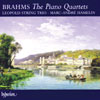Brahms (The) Piano Quartets
A sweeping joie de vivre conquers this music's extreme technical demands
View record and artist detailsRecord and Artist Details
Composer or Director: Johannes Brahms
Genre:
Chamber
Label: Hyperion
Magazine Review Date: 1/2007
Media Format: CD or Download
Media Runtime: 142
Mastering:
Stereo
DDD
Catalogue Number: CDA67471/2

Tracks:
| Composition | Artist Credit |
|---|---|
| Piano Quartet No. 1 |
Johannes Brahms, Composer
Johannes Brahms, Composer Leopold String Trio Marc-André Hamelin, Piano |
| Piano Quartet No. 2 |
Johannes Brahms, Composer
Johannes Brahms, Composer Leopold String Trio Marc-André Hamelin, Piano |
| Piano Quartet No. 3 |
Johannes Brahms, Composer
Johannes Brahms, Composer Leopold String Trio Marc-André Hamelin, Piano |
| (3) Pieces |
Johannes Brahms, Composer
Johannes Brahms, Composer Marc-André Hamelin, Piano |
Author: Harriet Smith
Of all Brahms’s chamber music, I’ve always felt his finest works were the quintets and sextets. In the smaller line-ups textures can sometimes get clogged, as if the composer had metaphorically donned one overcoat too many. His three piano quartets sometimes exhibit this tendency but in performances as fine as these it is triumphantly surmounted with a combination of brisk speeds and an extraordinary collective joie de vivre.
The G minor Quartet (No 1) opens simply, with Hamelin shaping the line beautifully but unaffectedly, the Leopold players gradually entering, their playing filled with ardour. The Zigeuner-finale is irresistibly ebullient, with a jaw-dropping ending; alongside them, Domus (Virgin, 1/89), fine though they are on their own terms, sound a touch hidebound. The other aspect that is so impressive about these readings is the sense of absolute precision, which lightens the textures and keeps edges crisp. Sample, for instance, the Scherzo of the C minor (No 3) which can, in some hands, sound positively elephantine. Not here though, Hamelin dealing with Brahms’s dense chords as easily as if they were single lines.
The epic A major Quartet (No 2), more a symphony than a quartet, is a considerable challenge to players and audience. Hamelin and the Leopold get to the heart of the matter in the soulful Poco adagio and while they in no way lack heft when it’s needed, particularly in the opening movement, there’s always a dancing quality to their playing which does much to illuminate textures. This music certainly benefits from their defiantly un-Germanic approach.
Hamelin signs off with the Op 117 Intermezzi, as well recorded as the rest of the disc. They’re elegantly played, but the main reason for buying this CD lies firmly with the quartets.
The G minor Quartet (No 1) opens simply, with Hamelin shaping the line beautifully but unaffectedly, the Leopold players gradually entering, their playing filled with ardour. The Zigeuner-finale is irresistibly ebullient, with a jaw-dropping ending; alongside them, Domus (Virgin, 1/89), fine though they are on their own terms, sound a touch hidebound. The other aspect that is so impressive about these readings is the sense of absolute precision, which lightens the textures and keeps edges crisp. Sample, for instance, the Scherzo of the C minor (No 3) which can, in some hands, sound positively elephantine. Not here though, Hamelin dealing with Brahms’s dense chords as easily as if they were single lines.
The epic A major Quartet (No 2), more a symphony than a quartet, is a considerable challenge to players and audience. Hamelin and the Leopold get to the heart of the matter in the soulful Poco adagio and while they in no way lack heft when it’s needed, particularly in the opening movement, there’s always a dancing quality to their playing which does much to illuminate textures. This music certainly benefits from their defiantly un-Germanic approach.
Hamelin signs off with the Op 117 Intermezzi, as well recorded as the rest of the disc. They’re elegantly played, but the main reason for buying this CD lies firmly with the quartets.
Discover the world's largest classical music catalogue with Presto Music.

Gramophone Digital Club
- Digital Edition
- Digital Archive
- Reviews Database
- Full website access
From £8.75 / month
Subscribe
Gramophone Full Club
- Print Edition
- Digital Edition
- Digital Archive
- Reviews Database
- Full website access
From £11.00 / month
Subscribe
If you are a library, university or other organisation that would be interested in an institutional subscription to Gramophone please click here for further information.




